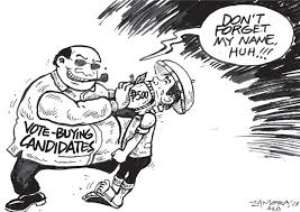
Ghana for you. Reactionary at best. Nothing new here. What seem interesting to me however, is the evolving theory which seeks to investigate the nuance; that imperceptible distinction between vote-buying and vote-leveraging. The difference bothers not only on moral philosophy but civic choice architecture in a fledgling democracy.
Let's call a spade its name, vote-buying has no philosophical or moral foundation to stand-on. The real culprit here is the profane incursion of libertarian dogma into our democratic space, and how same has occasioned the treatment of political choice as a market commodity to be sold to the highest bidder and vilest propagandist. The dearth of popular compliments for this brand of cheesy politicking is in and of itself a rebuke.
The other one though, vote-leveraging, hmm! now thats tricky. The moral arguments are nuanced and its appeal compelling. Take for instance the situation of the recent protest in Hodzo, Takla and Kpenoe, all in the Volta Region. Their cry? No Roads, No Vote! Their argument? drivers take GH¢5 , GH¢7 while motorbikes take GH¢12 from Ho to Hodzo. Why? Because, in their estimation, the drivers overcharge due to bad roads, albeit the distance is short. Now, I can't validate this viewpoint because I have not done any independent analysis to enable me form an intelligent view. But I like to assume that an entire community human beings clamoring for what is a public good, are doing so on the basis of rational thinking. Bear in mind, there is no private gain here. This is a public good, which, if our local governance systems were working efficiently, should have been provided anyway. The people of Hodzo, I would argue, are LEVERAGING their vote for a public good they should have received without using their vote as leverage. That's the powerful appeal of this argument. Its rational, its impersonal, its democratic. The moral downside (if you choose to see it in that light) is that the people of Hodzo, Takla and Kpenoe are not the only ones with infrastructural deficits. Indeed the demand for integrated development is such an imperative that infrastructure has to be aligned with resource-rich enclaves that will add value (more quicker) to gross outputs in order to generate more revenue for infrastructure. So if political actors allocate development capital on the basis of who shouts the loudest, especially when those voices are from their"world bank", then that's morally reprehensible. It goes for NPP, NDC, PPP and all in between.
My conclusion? Vote-buying is wrong, no matter who does it. Vote-leveraging on the other hand is nothing short of revenge of the masses, undesirable but necessary.




 Lay KPMG audit report on SML-GRA contract before Parliament – Isaac Adongo tells...
Lay KPMG audit report on SML-GRA contract before Parliament – Isaac Adongo tells...
 Supervisor remanded for stabbing businessman with broken bottle and screwdriver
Supervisor remanded for stabbing businessman with broken bottle and screwdriver
 NDC watching EC and NPP closely on Returning Officer recruitment — Omane Boamah
NDC watching EC and NPP closely on Returning Officer recruitment — Omane Boamah
 Your decision to contest for president again is pathetic – Annoh-Dompreh blasts ...
Your decision to contest for president again is pathetic – Annoh-Dompreh blasts ...
 Election 2024: Security agencies ready to keep peace and secure the country — IG...
Election 2024: Security agencies ready to keep peace and secure the country — IG...
 People no longer place value in public basic schools; new uniforms, painting wil...
People no longer place value in public basic schools; new uniforms, painting wil...
 'Comedian' Paul Adom Otchere needs help – Sulemana Braimah
'Comedian' Paul Adom Otchere needs help – Sulemana Braimah
 Ejisu by-election: Only 33% of voters can be swayed by inducement — Global InfoA...
Ejisu by-election: Only 33% of voters can be swayed by inducement — Global InfoA...
 Minority will expose the beneficial owners of SML, recover funds paid to company...
Minority will expose the beneficial owners of SML, recover funds paid to company...
 Prof. Opoku-Agyemang has ‘decapitated’ the NPP’s strategies; don’t take them ser...
Prof. Opoku-Agyemang has ‘decapitated’ the NPP’s strategies; don’t take them ser...
